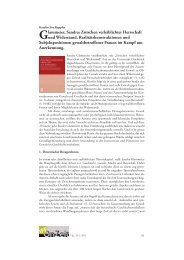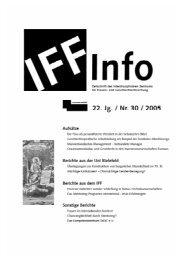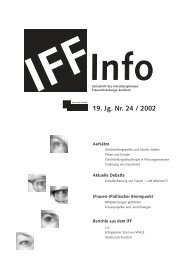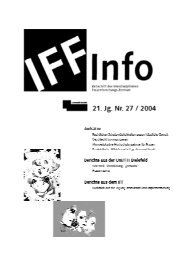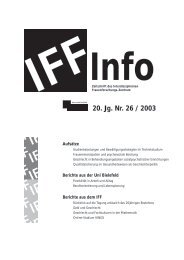IFFOnZeit Nr.1, 2009
IFFOnZeit Nr.1, 2009
IFFOnZeit Nr.1, 2009
Erfolgreiche ePaper selbst erstellen
Machen Sie aus Ihren PDF Publikationen ein blätterbares Flipbook mit unserer einzigartigen Google optimierten e-Paper Software.
Rezensionen<br />
results from the external evaluation. Her findings show that implementations (processes)<br />
of gender mainstreaming require preparation in advance, especially in terms of creating a<br />
supportive structure within the organisation. This allows negotiation, dealing with resistance,<br />
establishing objectives and carrying them out in a collaborative process, finally also<br />
learning from the results. In the case of the pilot scheme, such a supporting structure was<br />
not created. Hence, although lots of activities took place and the knowledge about gender<br />
mainstreaming increased, nearly no rethinking processes among teacher trainers and organisational<br />
actors as well as no structural changes took place. In their paper “Balancing<br />
and Optimising Gender Mainstreaming at German Universities” Quirin J. Bauer and<br />
Susanne Gruber (University of Augsburg, Germany) present first results of an evaluation<br />
study on the implementation (process) of gender mainstreaming, goals of various gender<br />
mainstreaming measures, and the relationships of this measures to previous gender equality<br />
programmes at 15 German universities. The authors also point out to factors leading<br />
to success or failure of gender mainstreaming measures or programmes, which they could<br />
identify in their study. One of their important findings is that “gender mainstreaming<br />
measures can work very well if several strategic steps are taken and if they are not reduced<br />
to just one goal” (p. 134).<br />
Since decades promoting women for leadership and increasing the percentage of<br />
women in leadership positions is a central request of gender equality programmes. Also<br />
in this field evaluations are necessary to identify the most effective examples from all over<br />
the world. Also in Australian universities women are in the majority as both staff and<br />
students. Still they remain underrepresented at the senior and management levels. Since<br />
the 1990s several leadership development programs for women were launched at Australian<br />
universities. In her paper “Leading women: The Positive Impact of Women and<br />
Leadership Programs” Lyn Browning (University of South Australia, Australia) presents<br />
the findings of the evaluation of the Women and Leadership program at the University<br />
of South Australia, which was implemented in 1996 and the Women in Leadership Program<br />
at Griffith University (Australia), which commenced in 2004. The evaluation results<br />
of both programmes show clear impacts and effects: 1. women reported a number of<br />
positive changes in their working lives which they attribute to their involvement in these<br />
programmes; 2. the participation rate of women staff (also in senior and decision-making<br />
positions) has increased at both universities. Therefor the author summarizes: “The evidence<br />
supports leadership development programmes for women as a contributing factor<br />
to the promotion, retention, and positive changes to the working lives of women staff,<br />
and in turn, to the culture of universities.” (p. 190). Based on the experiences from these<br />
two successful examples, the author phrases a list of general recommendations for leadership<br />
development programmes for women, which could be helpful for other scientific<br />
institutions and universities.<br />
In recent years multiple studies have highlighted the importance of professional<br />
assistance for a successful academic career, and have identified mentoring as a strong<br />
instrument for promoting young scientists, especially for women in higher education,<br />
academia or research. These have led to initialization and installation of various national<br />
and international mentoring programmes for women (or both genders). Two articles of<br />
the anthology refer to concepts of and experiences with such mentoring programmes<br />
as well as to questions concerning important factors for their acceptance and success.<br />
In their paper “Promoting Women Researchers through Mentoring Eument-Net as a<br />
Basis for a European Network of Mentoring Programmes for Women in Academia and<br />
1. Jg., Nr. 1, <strong>2009</strong><br />
151



